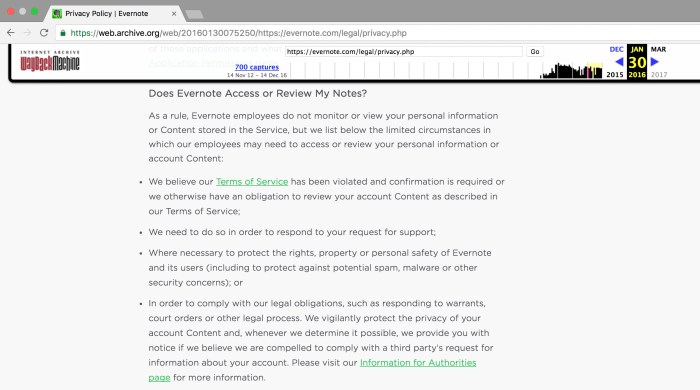Evernote ceo respond privacy policy – Evernote CEO responds: Privacy Policy Update. The elephant in the digital room? Data privacy. For years, Evernote has walked a tightrope, balancing user convenience with the increasingly crucial need for robust data protection. This deep dive explores the company’s public statements, the CEO’s role in shaping policy, and the impact of these decisions on user trust and brand perception. We’ll dissect Evernote’s security measures, transparency levels, and how they stack up against competitors. Buckle up, it’s a data-driven rollercoaster.
From press releases to blog posts and CEO interviews, we’ll trace Evernote’s evolving stance on privacy. We’ll examine how their policies have changed over time, the reasons behind those changes, and the resulting user reactions. We’ll also look at the concrete steps Evernote has taken (or should take) to bolster data security and user control, all while considering the broader context of privacy regulations like GDPR and CCPA.
CEO’s Role in Shaping Privacy Policy: Evernote Ceo Respond Privacy Policy
The CEO of a company like Evernote plays a pivotal role in establishing and maintaining its privacy policy. It’s not just a matter of ticking regulatory boxes; it’s about setting the company’s ethical compass and influencing its overall culture regarding data handling. The CEO’s vision directly impacts how user data is treated, influencing everything from internal procedures to public communication.
The CEO’s direct involvement in Evernote’s privacy policy is multifaceted. While specific details of internal processes aren’t usually public, it’s reasonable to assume the CEO is heavily involved in the high-level strategic decisions concerning data privacy. This includes approving the policy itself, overseeing its implementation, and ensuring alignment with the company’s overall mission and values. This isn’t simply a delegated task; it’s a leadership responsibility demanding active participation and oversight.
CEO’s Public Statements on Privacy, Evernote ceo respond privacy policy
While pinpointing specific interviews where Evernote’s CEO explicitly details every nuance of their privacy policy is difficult without access to internal communications, their public statements and the company’s overall messaging reflect their stance on user data. We can infer the CEO’s involvement through the company’s public commitments to data security and transparency. For instance, press releases announcing security upgrades or policy updates indirectly showcase the CEO’s commitment to user privacy. The overall tone and emphasis on data security in these communications indicate the CEO’s prioritization of the issue. Analyzing Evernote’s blog posts, press releases, and other public-facing materials provides valuable insights into their approach to user data privacy, indirectly reflecting the CEO’s influence.
CEO’s Responsibility for Compliance and Trust
The CEO bears the ultimate responsibility for ensuring Evernote complies with all relevant privacy regulations, such as GDPR and CCPA. Failure to do so can lead to significant legal and reputational damage. Beyond legal compliance, the CEO is responsible for maintaining user trust. This involves proactively addressing user concerns, being transparent about data practices, and reacting swiftly and effectively to any privacy breaches. Maintaining user trust is crucial for the long-term success of the company; a breach of trust can lead to a loss of customers and damage the company’s brand image. For example, a swift and transparent response to a data breach, clearly outlining steps taken to mitigate the damage and prevent future occurrences, demonstrates responsible leadership and builds confidence. Conversely, a slow or opaque response can severely erode trust.
Potential CEO Actions to Address User Privacy Concerns
A proactive approach to user privacy is paramount. Here are some potential actions a CEO could take to address user concerns:
The CEO’s role extends beyond simply enacting policies; it includes fostering a culture of privacy within the organization. This requires active leadership, consistent communication, and a demonstrable commitment to user trust.
- Establish a dedicated privacy team with clear reporting lines to the CEO.
- Conduct regular privacy audits to identify and address vulnerabilities.
- Invest in advanced security technologies to protect user data.
- Implement robust data breach response plans.
- Proactively communicate with users about data practices and any changes to the privacy policy.
- Engage in open dialogue with privacy advocates and regulators.
- Promote a culture of privacy awareness and responsibility within the company.
Ultimately, Evernote’s journey with data privacy highlights the ongoing tension between innovation and user trust. Their responses – both public and behind the scenes – reveal a company grappling with the complexities of balancing user needs with the realities of data security in our increasingly digital world. While Evernote has made strides, the conversation is far from over. The future of their privacy policy hinges on continued transparency, proactive security measures, and a genuine commitment to user control. The question remains: will they successfully navigate this evolving landscape and maintain user confidence?
Evernote’s CEO’s response to the privacy policy uproar? Let’s just say it’s been… eventful. Meanwhile, if you’re suddenly scrambling for extra cloud storage after that whole debacle, you might want to check out this sweet deal: dropbox users can get 100gb free onedrive storage. Back to Evernote, though – I’m still waiting for that promised transparency.
 Insurfin Berita Teknologi Terbaru
Insurfin Berita Teknologi Terbaru
